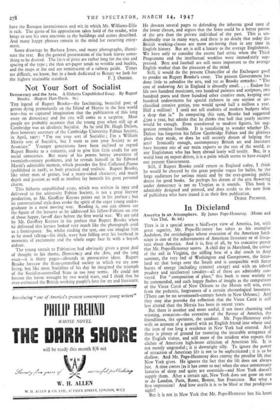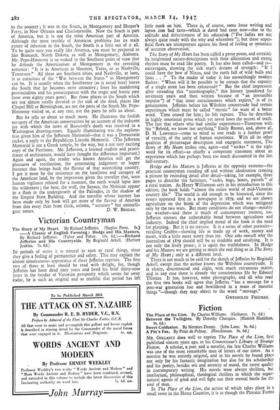In Dixieland
Tins is in a special sense a bird's-eye view of America, for, with great sagacity, Mr. Pope-Heanessy has taken as his exemplar Audubon, the ornithologist whose evocation of the American land- scape is one of the achievements of American literature or of litera- ture about America. And it is, first of all, by his evocative power that Mr. Pope-Hennessy scores. A chill day in Maryland, the colour of the soil in Virginia, the stifling heat of a day coach in deep summer, the very feel of Washington and Georgetown, the lotus- land air that hangs over the South and is compatible with fierce bursts of energy (including criminal energy) and with an inbred prudery and intellectual timidity—all of these are admirably con- veyed. For "composition of place," this book is most warmly to be commended, and such happy flashes of insight as the comparison of the Vieux Carte of New Orleans to the Marais will win, even from the pedantic, forgiveness of a certain chronological looseness. (There can be no seventeenth-century hotels in New Orleans.) And they may also provoke the reflection that the Vieux Carte is still less altered than the Marais has been in recent years.
But there is another and more useful, if not more charming and winning, evocation—the evocation of the flavour of America, the friendliness, the openness, the candour. Mr. Pope-Hennessy ends with an account of a quarrel with an English friend into whose soul the iron of too long a residence in New York had entered. And there is plenty of ground for resenting the incurable arrogance of the English visitor, and still more of the resident who repeats the clichés of American high-brow criticism of American life. It is not merely ungrateful ; it is downright silly. To ignore the power of attraction of American life is not to be sophisticated ; it is to be shallow. And Mr. Pope-Hennessy does convey the peculiar lift that New York gives. He ignores the fact that the lift does not always last. A time comes (as it has come to me) when the once unnecessary luxuries of sleep and quiet are essentials—and New York doesn't supply them. After a certain age, New York does not grow on one as do London, Paris, Rome, Boston, San Francisco. But what a first impression! And how sterile it is to be blase at that prodigious sight!
But it is not in New York that Mr. Pope-Hennessv lost his heart to the country ; it was in the South, in Montgomery and Harpees Ferry, in New Orleans and Charlottesville. Now the South is part of America, but it is not the mast American part of America. Although the most terrible of American problems has its main centre of infection in the South, the South is a little out of it all. To be quite sure you really like America, you must be prepared to like Bismarck, North Dakota, as well as Montgomery, Alabama. Mr. Pope-Hennessy is so soaked in the Southern point of view that he defends the Americanism of Montgomery in the revealing sentence : "It is as American as Houston, Texas, or as Nashville, Tennessee." All three are Southern cities, and Nashville, at least, is as conscious of the "War between the States" as Montgomery can be. It is usually when the Southerner (as is noted here) leaves the South that ha becomes most attractive ; loses his maddening provincialism and his preoccupation with the tragic and heroic past (now over eighty years gone). But those places in the South which are not almost totally devoted to the cult of the dead, places like Chapel Hill or Birmingham, are not the parts of the South Mr. Pope- Hennessy visited or, at any rate, not the parts he tells us about.
But he tells us about so much more. He illustrates the foolish savagery of the American conservatives by an account of the indecent joy with which the news of Roosevelt's death was received in a Washington drawing-room. Equally illuminating was the explana- tion given him of the Jefferson Memorial—that it was a Democratic racket, a reply to the Republican Lincoln Memorial. (The Jefferson Memorial is not a Greek temple, by the way, but a not very exciting copy of the Pantheon. Mr. Jefferson, a learned student and practi- tioner of architecture, would have thought the difference important.) Again and again, the reader who knows America will get the pleasures of recollection, the penetrating judgement or happy instance that brings back the flavour of that astonishing country. I got it most by the insistence on the loneliness and savagery of the American land, by the impression given the traveller that, were human vigilance relaxed for a moment, the earth would lapse into the wilderness ; the bear, the wolf, the Seneca, the Mohican appear in a flash in the undergrowth of the Palisades, in the shadow of the Empire State Building. And the traveller whose journey has been made only by book will get more of the flavour of America from this essay than from thick, solemn, " accurate " but unintelli-



































 Previous page
Previous page